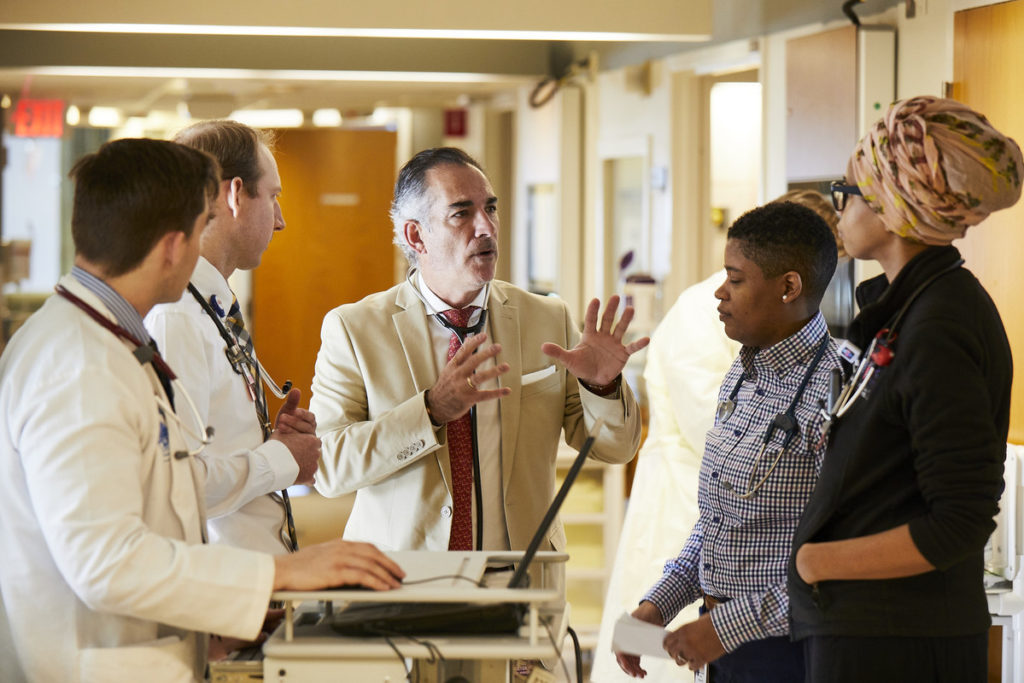Kerri Palamara McGrath, MD, is the director of the new Massachusetts General Hospital Center for Physician Well-Being, an effort designed to relieve physician stress and bolster patient care. Jointly funded by the Department of Medicine and the Massachusetts General Physicians Organization Frigoletto Committee Grant, its launch comes as recent studies suggest that physician burnout can negatively impact patient care and satisfaction.
“All we ask of faculty members is to be a part of the journey with new residents.”
Dr. Palamara McGrath has been passionate about the issue since she came to Mass General as a resident intern in 2006. What she recalls most about that time is the sense of isolation and insecurity. “I’m a doctor. Now what?” she remembers thinking. “Am I doing what I’m supposed to be doing? Is this how I’m supposed to feel as an intern?’”
The Long Island, New York, native realized how challenging it was for physicians to find the time to process and reflect on their experiences and overcome the stress that resulted from their long and often chaotic workdays. “I saw what happened when people tried to manage an 80-hour work week and the pressure,” Dr. Palamara McGrath says. “But there was no formal outlet to help address or reduce it.”

• Program Aims to Support Alzheimer’s Caregivers
• PACT Helps Parents with Cancer Talk with Children
• Primary Care Innovator Accelerates Change
• Mass General Nursing Innovation Enters New Era
Dr. Palamara McGrath identified a need for coaching at Mass General, and an even greater need to dive deeper into the issue of physician stress and burnout.
So, she dove in.
The Center for Physician Well-Being
Along with colleagues from the Mass General Mongan Institute for Health Policy, the Institute of Coaching at McLean Hospital and the Division of General Internal Medicine, Dr. Palamara McGrath spent the next eight years building the foundation of what was launched in June, 2019, as the Center for Physician Well-Being. Dr. Palamara McGrath describes it as a formal and focused effort to “support high-functioning teams, outstanding patient care and a positive workplace culture.” Unsurprisingly, coaching plays a key role in the equation.
A Coaching Model that Works
The center’s coaching program is the result of Dr. Palamara McGrath’s years of work on an evidence-based initiative, one designed to help every new resident forge a strong personal connection with a faculty member. “All we ask of faculty members is to be a part of the journey with new residents,” Dr. Palamara McGrath says. “It is a way for residents who are struggling to have a safe space to talk about their experiences.”
She adds that participating faculty members build skills in coaching and positive psychology, both of which help enrich relationships with patients and families, colleagues and other residents.
“How can we get to the source of physician stress? How can we support our teams?”
Today at Mass General, more than 300 trained faculty coaches work with 600 trainees. The model is being used in more than 40 resident and fellowship programs around the country. The program reflects Mass General’s steadfast commitment to training and mentoring the next generation of medical trailblazers and doing so in ways that help tackle the world’s most complex cases with compassionate, top-quality care.
Support Through Protected Time
Dr. Palamara McGrath sees the center’s role as one that also examines systems-level stress factors, leadership engagement, change management, clinical operations and efficiencies. “How can we get to the source of physician stress?” she asks. “How can we support our teams?”
The center’s “Joy in Learning” program represents one strategy. It offers “protected time” to faculty members to explore topics of interest, work with colleagues on new projects that they may not ordinarily pursue, or maybe spend time on the ground with a disaster response unit.
“If our doctors are less stressed, inevitably our patients will have a better experience at Mass General.”
“It’s a win-win,” Dr. Palamara McGrath says. “They come back to work with new knowledge and new approaches that they share with their clinical and care teams.” The program focuses on learning as a way to help faculty members find meaning in their work. This helps boost overall well-being.
A Sweeping Culture of Well-Being
Dr. Palamara McGrath wants the center to help strengthen Mass General’s position as a leader in creating a culture of well-being for clinicians, researchers and everyone in-between. She wants to make certain Mass General staffers in all departments know “what well-being looks like in all aspects of our lives, our work and our environment.
“It is only when well-being becomes positively contagious across the hospital, that we can start to successfully transform how we care for our patients,” Dr. Palamara McGrath says. “If our doctors are less stressed, inevitably our patients will have a better experience at Mass General.”
To learn more about how you can support the Center for Physician Well-Being, please contact us.


